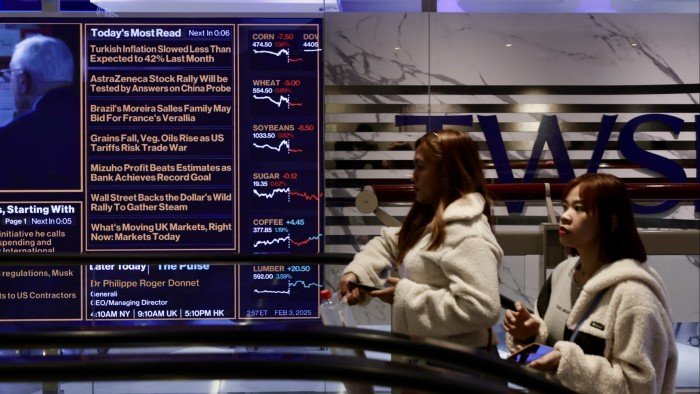Stay informed with free updates
Simply sign up to the Exchange traded funds myFT Digest — delivered directly to your inbox.
Latest news on ETFs
Visit our ETF Hub to find out more and to explore our in-depth data and comparison tools
The rising dominance of the exchange traded funds sector in Taiwan’s asset management market is continuing at pace despite regulatory calls to halt the growing imbalance between passive and active investing.
Assets in Taiwan’s locally listed ETFs surged by 55 per cent in 2024 to reach $195.88bn and now account for 66.1 per cent of all onshore public funds industry assets, according to data from Keystone Intelligence.
At the end of 2023 the local ETF sector had a 56.7 per cent market share of assets, while in 2018 ETF assets stood at just 27.5 per cent of the total market.
In contrast, assets in Taiwan’s onshore active mutual funds market grew by just 4 per cent overall to about $95.7bn, according to Keystone Intelligence data.

This article was previously published by Ignites Asia, a title owned by the FT Group.
Donna Chen, Taipei-based founder and president of Keystone Intelligence, said the rapid growth of Taiwan’s ETF market last year was aided by the domestic equities market being among the top performers in the world, causing more investors to look for quick access to local stocks at a lower cost.
Chen added that advertising campaigns and online influencers led to record fundraising from new high-dividend ETFs last year, which boosted ETF assets and took the industry by surprise.
Yuanta Funds, the market’s largest ETF provider, pulled in NT$170bn ($5.4bn) amid a fundraising frenzy during five days in March for its Yuanta Taiwan Value High Dividend ETF, smashing the previous record by a factor of five.
“We would never expect that a fund in Taiwan could raise $5bn. We thought it was not possible,” Chen said.
The massive fundraising attracted the attention of lawmakers who called on the regulator to address concerns about over-concentration of assets in stocks in the underlying indices used by ETFs.
Cathay Securities Investment Trust, Yuanta Funds and Uni-President AM were all fined NT$600,000 or more last year for using inappropriate advertising for their new high-dividend ETFs, including tempting investors with “expected” returns.
Chu Yueh-Chung, assistant professor at the department of finance of the Southern Taiwan University of Science and Technology, told Ignites Asia at the time that “unscrupulous” marketing tactics by fund houses had led to an “exaggerated rush” into new high-dividend ETFs.
At the start of last year, Taiwan’s Financial Supervisory Commission sent a letter to fund houses asking them to address the “severe imbalance” in the domestic funds industry by putting more focus on expanding the actively managed mutual funds sector.
This imbalance can be seen in the most recent list of the largest funds in Taiwan at the end of 2024.
Nineteen of the market’s 20 largest funds are ETFs, with just one money market fund occupying the spot as the 16th fund in the market.
These 19 ETFs account for nearly $120bn in assets, or around 42 per cent of the entire onshore market.
Keystone Intelligence’s Chen said that while regulators might be able to slow the issuance of new ETFs and punish errant marketing, they cannot control Taiwanese investors putting more money into existing ETFs.
That would depend mainly on how the market performed this year, she added.
Taiwan’s FSC has also pinned its hopes on investors choosing active ETFs over standard passive ETF strategies. From the start of 2025, the regulator opened the door for fund houses to apply to launch active ETFs with at least 15 companies expressing interest.
While active ETFs have yet to make a big impact in the ETF sectors of other Asia Pacific markets such as Australia, South Korea or Hong Kong, there are hopes that Taiwan might see a bigger uptake given the prominence ETFs have already secured.
“When you tune into different TV channels in Taiwan, there are TV programmes that tell you how to invest in ETFs,” said Chen.
“It’s like there has been a universal education,” she added. “If you ask people walking on the street if they have heard of ETFs, they would say ‘yes’.”
But active fund managers, whether mutual funds or ETFs, may also have to compete with a looming price war in the traditional passive ETF sectors.
Yuanta Funds announced that from February 24 it would slash the management fee of its huge Yuanta/P-Shares Taiwan Top 50 ETF from the existing flat fee of 0.32 per cent per annum to a sliding scale of between 0.15 per cent and 0.05 per cent depending on the size of assets invested.
Chen said this move could trigger a fee battle between Taiwan’s bigger ETF managers, which then might lead to further uptick in interest and flows for the ETF market.
*Ignites Asia is a news service published by FT Specialist for professionals working in the asset management industry. Trials and subscriptions are available at ignitesasia.com







